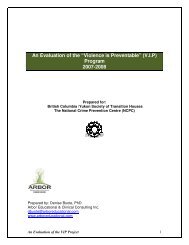a guide to supporting children exposed to domestic violence
a guide to supporting children exposed to domestic violence
a guide to supporting children exposed to domestic violence
You also want an ePaper? Increase the reach of your titles
YUMPU automatically turns print PDFs into web optimized ePapers that Google loves.
Roseanna‘s s<strong>to</strong>ry<br />
Shortly after Roseanna left Enrique she went back <strong>to</strong> work. Although she was tired<br />
and very busy, she knew that the three <strong>children</strong> needed the love and attention that<br />
they had missed.<br />
She gave each child 15 minutes “Special Time” at bedtime. They could choose any<br />
quiet activity. The other <strong>children</strong> could not interrupt during this time. She sat with an<br />
arm around 11-year-old Luc while he talked about his worries. Paul, aged 8, liked <strong>to</strong><br />
show her what he was doing on the “Neopets” website, or lie with his head on her<br />
lap and talk about school or friends. Julie, aged 5, wanted <strong>to</strong> sit on her lap, cuddle,<br />
and be read a s<strong>to</strong>ry.<br />
Can parents help their <strong>children</strong> grow up<br />
without emotional problems<br />
Research and experience has shown that there are some general principles about<br />
what <strong>children</strong> need so that they grow up well adjusted.<br />
There are many fac<strong>to</strong>rs that influence how <strong>children</strong> turn out. Parents may have<br />
little or no influence over some of these fac<strong>to</strong>rs. They include <strong>children</strong>’s<br />
experiences in school, with other <strong>children</strong> and adults in the community, accidents,<br />
trauma outside the home, and illnesses.<br />
Each child is an individual with their own personality. Some <strong>children</strong> are shy or<br />
slow <strong>to</strong> adapt <strong>to</strong> new situations. They are more likely <strong>to</strong> have difficulties with<br />
changes of home and school.<br />
The following suggestions about <strong>children</strong>’s emotional needs may help you look at<br />
what you are already doing and what might need extra attention.<br />
CHILDREN NEED AFFECTION<br />
This includes nurturing, caring, comforting, encouragement, and support. Living in<br />
an abusive situation, your <strong>children</strong> may have lacked attention, felt insecure or<br />
even rejected.<br />
• You may need <strong>to</strong> make an extra effort <strong>to</strong> show your <strong>children</strong> that you love<br />
them. Spend extra time with them; give them cuddles.<br />
• Encourage them <strong>to</strong> talk about their feelings and worries.<br />
• Praise them for their successes, however small.<br />
HELPING MY CHILD A GUIDE TO SUPPORTING CHILDREN EXPOSED TO DOMESTIC VIOLENCE 37






